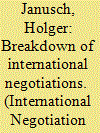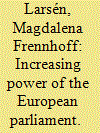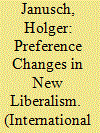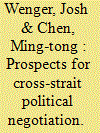|
|
|
Sort Order |
|
|
|
Items / Page
|
|
|
|
|
|
|
| Srl | Item |
| 1 |
ID:
148546


|
|
|
|
|
| Summary/Abstract |
This article examines whether the two-level game can theoretically explain negotiation breakdowns without referring to uncertainty alone. For this purpose, social conflicts are integrated in the two-level game. In this light, the classical hypothesis that smaller win-sets increase the risk of a negotiation breakdown can no longer be maintained. Instead, conflict intensity – and thereby the risk of breakdown – correlates with the intersection of the win-sets in the form of an inverted U-curve. It follows that negotiations are most likely to break down when the intersection of the win-sets is perceived as medium-sized, because the bargaining space and thereby the potential of conflict intensity is largest/highest. Furthermore, the insertion of social conflicts into the equation runs counter to the hypothesis that issue linkages facilitate international cooperation. On the contrary, issue linkages increase the risk that goal conflicts, in particular, intensify each other by spreading from one issue to another.
|
|
|
|
|
|
|
|
|
|
|
|
|
|
|
|
| 2 |
ID:
155709


|
|
|
|
|
| Summary/Abstract |
Since the Lisbon Treaty increased the legal role of the European Parliament (EP) in EU trade policy, there has been a debate about the extent to which these legal competencies have translated into actual influence over the content and outcome of EU trade negotiations. Using the trade negotiations between the EU and India as a case study, this article argues that the impact of the EP has indeed been significant. Through two-level game analysis, which extends its domestic focus to include the EP as a domestic constituent, it demonstrates how the EP has affected the EU win-set in ways that have both hindered and facilitated agreement at the international level between the EU and India. It also shows how the EP has affected the negotiating dynamics and how the EU negotiators have had their preferences somewhat compromised by the EP in their attempt at reaching an agreement with India.
|
|
|
|
|
|
|
|
|
|
|
|
|
|
|
|
| 3 |
ID:
147591


|
|
|
|
|
| Summary/Abstract |
In July 2015, after more than a decade of negotiations, the international community and Iran finally reached agreement over Iran’s nuclear programme. All of the work that produced the Joint Comprehensive Plan of Action [JCPOA] was nearly undone, however, by the United States Congress, which came close to killing the agreement. This episode emphasises the fact that international negotiations are “two-level games” in which policy-makers must take into account not only their own objectives and those of their interlocutors but also the interests of domestic constituencies if they are to secure the “ratification” of an agreement. In many cases, securing the consent of those constituencies is unproblematic, whether because the matter at hand is uncontroversial, domestic interests are disengaged, or policy-makers have sufficient autonomy from them to ignore their objections. In other cases, however, the domestic game can play a huge part in determining the eventual outcome of the negotiating process. As the intensity of the debate within the United States in 2015 and the narrowness of the margin by which the JCPOA survived suggest, the American–Iranian dimension of the nuclear negotiations falls into the latter category.
|
|
|
|
|
|
|
|
|
|
|
|
|
|
|
|
| 4 |
ID:
160866


|
|
|
|
|
| Summary/Abstract |
In classical two-level games, international cooperation is less likely when there is large programmatic distance and smaller domestic win-sets as a result of changing preferences. The US trade negotiations with South Korea and Colombia question this hypothesis and emphasize two empirical insights that can be integrated into the two-level game to improve its explanatory power. First, smaller win-sets due to preference changes can mitigate conflicts of distribution and make cooperation more likely if the negotiators are aware of the smaller win-sets. Second, when negotiators perceive the already achieved bargaining results as a new status quo, former positive sum games can transform into zero sum games, which makes cooperation more difficult, irrespective of the size of the win-sets. Negotiators who perceive conflicts as zero sum games will put more effort into avoiding losses and, as a result, domestic constraints cannot be used as bargaining levers vis-à-vis a foreign country.
|
|
|
|
|
|
|
|
|
|
|
|
|
|
|
|
| 5 |
ID:
156604


|
|
|
|
|
| Summary/Abstract |
This study adopts a pre-negotiation approach based on Robert Putnam's win-set concept to examine domestic constraints on cross-Strait political negotiation. Survey research of elite opinion in both China and Taiwan and of public opinion in Taiwan is used to estimate each side's win-set (that is, the set of political negotiation outcomes that could win majority approval domestically) during Ma Ying-jeou's second presidential term in Taiwan (2012–2016). The possibility for overlap in win-sets that could provide a zone of possible agreement and the potential for coalitions in favour of negotiation are analysed. The study finds no win-set overlap and limited potential for coalitions favouring negotiation outcomes with the least distance from overlap, concluding that domestic conditions for formal political negotiations between Beijing and Taipei are unlikely to be ripe in the near term.
|
|
|
|
|
|
|
|
|
|
|
|
|
|
|
|
| 6 |
ID:
071775


|
|
|
|
|
| Publication |
2006.
|
| Summary/Abstract |
This article employs a cross-level approach to explain cooperation in transatlantic competition policy. The explanation reveals the important role of regulators as interfaces between the domestic and international levels of analysis. Economic internationalization is a system-level cause of this cooperation, the precise effect of which is accounted for by an intervening variable (domestic politics), which is simplified with a principal-agent model. The negotiations over the 1991 EU-US Bilateral Competition Agreement suggest that, while regulators remain constrained by domestic institutions, they play an important role in explaining why the formal, transatlantic cooperative framework is largely a discretionary one created by a non-treaty international agreement.
|
|
|
|
|
|
|
|
|
|
|
|
|
|
|
|
| 7 |
ID:
168061


|
|
|
|
|
| Summary/Abstract |
International relations scholars have struggled to adequately link domestic and international levels in theoretical models and causal analyses of foreign policy, despite widespread acknowledgment of the need to do so. This study elaborates on this challenge by assessing the utility of several policy process frameworks that have so far been underutilized in foreign policy analysis. The assumptions of one particularly fruitful method, the Two-Level Game, will be compared with those of three policy process frameworks: the Advocacy Coalition Framework, the Multiple Streams Framework, and Punctuated Equilibrium Theory. When analyzing three specific concepts (the question of rationality, the dynamics of agenda setting, and the strategic action of relevant actors), it is apparent that the assumptions of the policy process frameworks largely clash with those of the Two-Level Game, raising the potential for their augmentation of the field of foreign policy analysis despite their relative underuse.
|
|
|
|
|
|
|
|
|
|
|
|
|
|
|
|
|
|
|
|
|